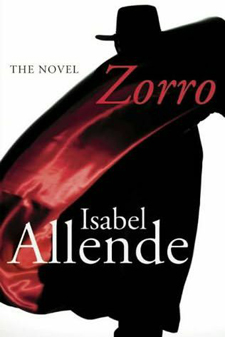Diego de la Vega, the boy who came to be known by his alter ego, Zorro, started wearing a mask to conceal the fact that he had big ears.
This delicious detail from Isabel Allende's retelling of the legend tells a lot about the story in which she, as narrator, is not afraid to laugh at the hero and he is not afraid to laugh at himself.
Allende's novel begins before Diego's birth in the Spanish colony of Alta California in the early 19th century, providing the background of how Zorro was born and came to be the dashing masked man of legend and many Hollywood trifles.

The product of a Spanish noble and his ill-fated marriage with an American Indian woman who is "civilised' by the Spanish, Diego's life is guaranteed to be unusual, with great privilege marked by pride in his bi-racial blood. His childhood is mirrored by the life of Bernardo, an Indian boy born to a servant in Diego's hacienda at the same time as Diego. They are referred to as "milk brothers' throughout.
The influences of Spanish society and Indian culture take equal place as he matures. His maternal grandmother, an Indian shaman, puts the teenage boys through initiation rites in which Diego discovers his spiritual connection to the fox that loves the night.
Years later, as Diego signs up as a member of La Justicia, a secret Spanish society that fights for the oppressed and unlawfully imprisoned, he already knows what his code name will be: Zorro is the Spanish word for fox.
He fights against the tyranny of the Napoleonic conquest of the Spanish, and then against the tyranny of the restored Spanish power elite once Napoleon has been removed. His loyalty is not to the reigning power but to the ideals of honour, justice, respect, dignity and courage, a creed learned from his grandmother and reinforced by his experiences in Spain.
These virtues are portrayed more vividly and effectively in the novel than the feeble Christian church, characterised by the Spanish padre in the colony and the mixture of faith and superstition of the Spanish ruling class.
One must ask how Zorro's political and spiritual choices reflect those of the Chilean-born author, who no doubt saw enough tyranny and hypocrisy in her own early years.
Trained in the arts of fencing and self-control, Diego's Zorro fuses the manly culture of his father with the values of his childhood in the untamed American West. His motives are pure, although his methods are not always so, and for much of the story he is driven by his love of a beautiful young woman.
The legend of Zorro is as much about heroism and cunning as it is about his devastating appeal to women. This tale, which closes at the beginning of Zorro's adult career, leaves us in no doubt that many will fall for his charms. It certainly left a smile on the face of this reviewer and there aren't many contemporary novels that actually achieve that.






















